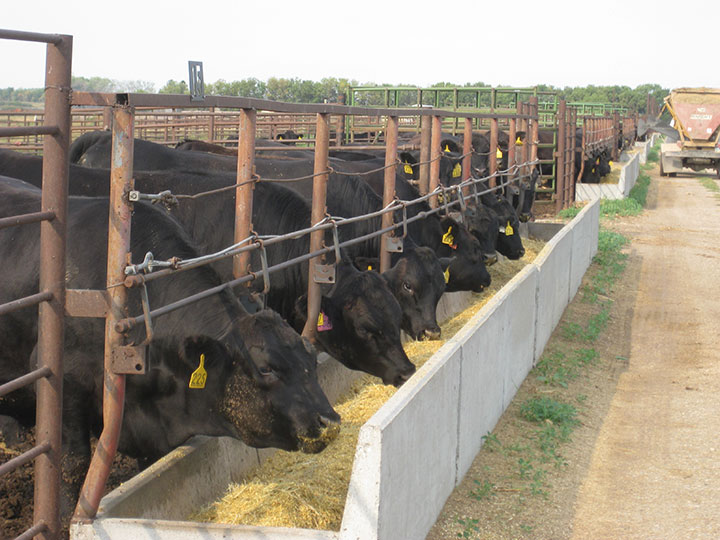
NDSU’s Carrington Research Extension Center is partnering with the North Dakota Angus Association to host the second annual Angus calf feed-out program.
Angus producers can consign steers to the North Dakota Angus University program at the Research Extension Center. The producers can retain ownership of the animals through the feedlot-finishing period and receive information about the feedlot performance of their cattle and carcass data after the animals are marketed.
The program's objectives are to provide Angus producers with performance and carcass information for animals that are finished in a conventional North Dakota feedlot environment, and conduct valid, replicated feedlot nutrition, environmental and animal well-being research using Angus genetics.
Producers will receive periodic progress reports on their calves' performance and a final report on the overall performance, efficiency and carcass traits of their calves.
This program also:
- Increases awareness of the potential profitability of summer feedlot finishing in North Dakota
- Promotes use of diverse grain and crop co-products available in the region
- Assesses value that can be realized by feeding cattle in North Dakota instead of transporting them to feedlots out of state
The first North Dakota Angus University program was held during the summer and fall of 2012. Five producers consigned a total of 139 yearling and fall steer calves.
In addition to being in the feed-out program, these steers were part of a feedlot research trial at the Research Extension Center. The calves gained an average of 4.5 pounds per day and had a feed efficiency of 6.31 pounds of dry-matter feed intake per pound of weight gain. They also had a dressing percentage of 63.5 percent, with 87 percent grading choice or better.
Mike Wendel of LaMoure, N.D., who consigned calves to the program, was pleased with the animals' results.
"Not only did we get the carcass data back from the cattle we had at the university, but we also did a carcass and profit comparison to the calves we had there against the calves we kept at home," he says.
"I think that was a huge bonus for us," he added. "We compared our rate of gain and carcass performance. It was a nice, unbiased comparison, and the whole process has been very educational."
Producers are not limited in the number of calves they can enter in the program, but they must consign animals in multiples of four. The calves being entered in this year's program should be delivered to the Research Extension Center the week of May 13-17.
For more information, contact the center at 701-652-2951 or the following people at the center:
- Vern Anderson, animal scientist, at vern.anderson@ndsu.edu
- Chanda Engel, animal science research specialist, at chanda.engel@ndsu.edu
- Karl Hoppe, area Extension Service livestock specialist, at karl.hoppe@ndsu.edu
Information about the program also is available from Wendel, a member of the North Dakota Angus Association board, at 701-710-0425 or Nathan and Emily Spickler, the association's secretary, at ndangus@daktel.com.
NDSU is recognized as one of the nation's top 108 public and private universities by the Carnegie Commission on Higher Education.